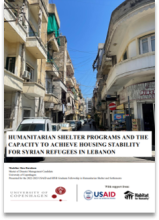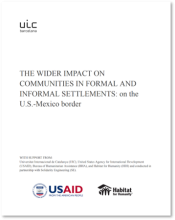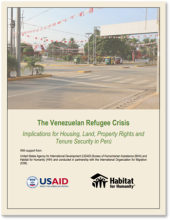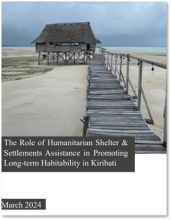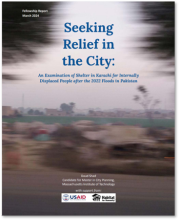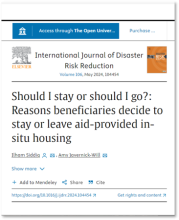Research Initiatives
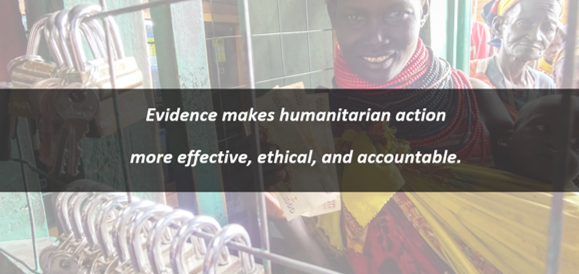
Shelter Cluster Research and Evidence
The Global Shelter Cluster (GSC) provides humanitarian decision-makers with access to the latest evidence on shelter and settlements in humanitarian crises because evidence makes humanitarian action more effective, more ethical, and more accountable. This work is hosted on behalf of the GSC by Habitat for Humanity.
This work is guided by two key strategic objectives:
First, evidence gaps are filled with strategic research in support of evidence-based responses, and to achieve policy and system change.
Second, existing evidence is available to shelter and settlement practitioners and used to enable adequate shelter and settlement in humanitarian crises.
The GSC encourages researchers to generate new research within the priority themes of the GSC Research Agenda. These themes were chosen through a consultation with Cluster Coordinators and they represent key areas where there are gaps in the evidence needed for humanitarian assistance:
- The Wider Impact of Shelter and Settlements
- Moving from Relief to Recovery
- Cash and Markets Approaches
The GSC has supported the following studies which contribute towards the evidence base for supporting shelter and settlements in humanitarian crises. The GSC can also support researchers who focus outside these priority themes where there is a clear need for evidence in a specific humanitarian crisis.
Global Studies
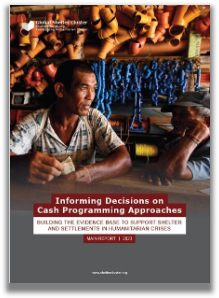
Informing Decisions on Cash Programming Approaches
The primary objective of this research is to increase the confidence of practitioners in the humanitarian shelter and settlements sector who must choose among modalities which include cash assistance.
The evidence provided by this research is intended to enable humanitarian shelter and settlements practitioners to provide more appropriate support, resulting in more successful outcomes for those affected by crises. This research contributes to the evidence base for supporting those who have lost their shelter and settlements in humanitarian crises.
This research led to the development of Decision Tree tools to support informed decision making on the use of cash for shelter and settlements programming.
Coming soon 'Navigating Relief to Recovery in Humanitarian Shelter and Settlements'
with the University of Sydney
MENA
Madelene Burnham University of Copenhagen
This study evaluates housing stability and the outcomes of humanitarian shelter programs for Syrian HHs over the course of migration and displacement in Lebanon. It contributes to a limited body of knowledge surrounding the housing experiences of Syrian HHs from the onset of the Syrian Refugee Crisis to present day, while also investigating challenges to stability that prevent humanitarian support from spurring longer-term improvements to housing stability post-program.
Americas
Andrea Batarse, Universitat Internacional de Catalunya (UIC)
Spatial analysis of formal and informal settlements located in violent urban spaces visualise play and public space accessibility act as proxy health indicators for child migrant well-being and happiness, as well as community stability. In this study, mapping methodologies augmented by interview analysis highlight the positive impacts of shelter and settlement assistance on health outcomes of migrant populations and the obstacles that can impede them. Case studies are drawn from formal and informal settlements located along the U.S.-Mexico border in Reynosa.
Melina Holder, University of California Berkeley
This report examines the context of housing, land, property rights (HLP) and tenure security for migrants and refugees in the context of urban Latin America, specifically Perú. As the world urbanizes and climate change, conflict and economic hardship creates more protracted and cross-border displacement, humanitarian responses to HLP and tenure security must focus on long-term solutions for urban integration while ensuring that host communities have the capacity to welcome increasingly large numbers of migrants and refugees.
Asia and Pacific
Emily Nabong, University of Sydney
The Pacific region is experiencing an increasing frequency and severity of climate change-related hazards leading to higher likelihoods for recurring disasters. This study uses a whole-of-system approach to explore how humanitarian shelter and settlements assistance can be used to promote lasting habitability in this region, with a specific focus in Kiribati. This work is intended to help advance humanitarian assistance by considering the long-term and holistic needs of climate affected countries.
Daud Shad, Massachusetts Institute of Technology
The floods that occurred during the 2022 monsoon season in Pakistan caused widespread devastation and displacement. Karachi, Sindh’s largest city and the country’s economic center, was the destination for countless IDPs. This study considers how key decision-makers in Karachi can equitably and sustainably accommodate the short and long-term shelter needs of flood-displaced populations who migrate to the city.
Ilham Siddiq, University of Colorado Boulder
Providing in-situ housing after a disaster is thought to prevent issues resulting in housing inoccupancy. In-situ housing, or housing built at the original site, aims to retain beneficiary connection to people, place, and livelihoods, addressing many noted challenges of building at relocated sites. However, beneficiaries have left thousands of aid-provided in-situ houses in post-tsunami Aceh, Indonesia. This research conducted and analyzed questionnaires administered to beneficiaries that both stayed and left their provided in-situ housing almost two decades post-tsunami, exploring the reasons for their decisions.

